

Faculty play an important role in educational institutions as they are tasked with educating students who will become the future generation of workers and innovators.
In this inaugural faculty interview, we sat down with Dr. Swati Mishra, an English instructor at Alexander College.

With over 10 years of post-secondary teaching experience in Canada and India, Dr. Mishra received the Alexander College Faculty Award for Excellence in Instruction during the 2024 Spring Convocation Ceremony.
*The following interview has been edited for clarity and brevity.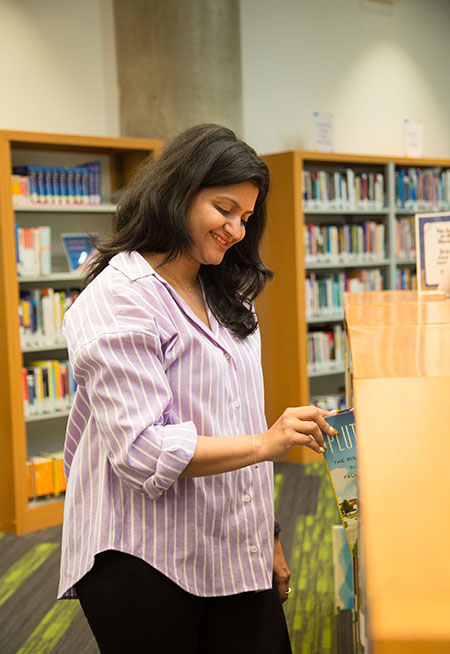
Q. Tell me a little about yourself.
Well, I’ve always been fascinated by stories as a child. I remember waiting for my grandmother to come every night and tell me those fairy tales and mythological stories.
I guess those things sparked my interest for storytelling and literature in general.
That’s how I started doing my Bachelor’s degree and with every book I read from the course syllabi I felt like, ‘Oh my God, I am not leaving this world anytime soon!’
And it all started with a Bachelor’s, moved on to Master’s and I recently completed my PhD in 2021 which, incidentally, is also the year I moved to Canada.
Before coming to Canada, I worked as an Assistant professor in University of Mumbai in India for over seven years.
In the last three years here, I have had the opportunity to be working with diverse learning groups and it has been fun because the environment in here is really diverse and inclusive.
Q. What are some of your achievements and publications?
I’ve written around seven or eight papers published across Asia and India mostly, but I would want to tell you about this one publication, which is very close to my heart.
For that, I need to give you a premise. So in 2018, the Supreme Court of India decriminalized private consensual sex between adults of the same sex.
Around 2019, I was lucky enough to be funded by University of Mumbai and I spearheaded a research initiative wherein we revisited the works of some of the prominent and influential South Asian writers to see how these voices have always been there, but they were often muted or subjugated.
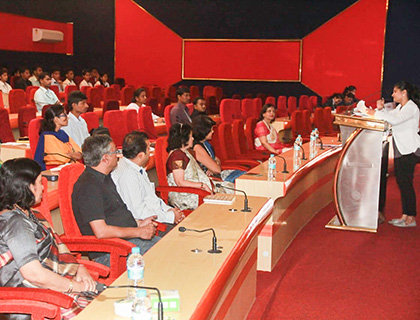
Why I say this is important to me and particularly meaningful is because India is evolving as a nation.
I felt then that even if it was at a miniscule level, I was able to contribute to the national identity, of which national literature is an essential component of. That’s why I feel this is really close to my heart and it also aligns with my PhD research.
Q. What are your thoughts on receiving the Spring 2024 Faculty Award for Excellence in Instruction?
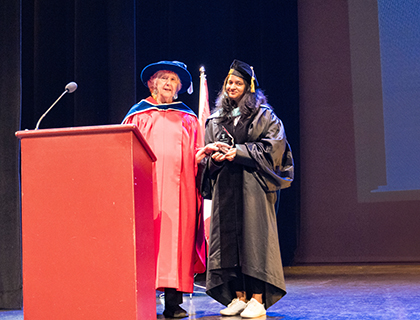
Two things: I am humbled and I’m honored. It fills me with a deep sense of gratitude, honestly.
I’m not a deeply religious person, but I do believe that teaching is one of the most sacred professions one can have.
When someone recognizes your efforts, specifically your students and your management, it solidifies your belief system and you know, pushes you and boosts your morale to continue to do the good work.
Here I would like to give a shout out to my students. Thank you. ‘We are because you are!’ When I say thank you, these two words might seem very small, but I mean them in a very big way. Thank you.
Q. What do you like about Alexander College?
Yes, many things, but off the top of my head, one thing that I often think about is the fact that I love the way structure amalgamates with openness here.
Everything is structured, but we as instructors get enough room for experimentation. We get to experiment with our stuff, with our material, with our teaching methodology. That’s fun.
Second, like I’d said earlier, ‘the best part about my classroom is who I share it with’. I love having conversations with my students and learning about different cultures.
And most important, the support system.
Be it my H.O.D. [Head of Department] Graeme, my colleagues, ISC [Instructional Support Centre], Dean’s office, they have always been so supportive. They’ve helped me understand the Canadian education tapestry so well — I was clueless when I came in here.
I really appreciate this and I’m grateful for this support system that Alexander College offers. I love my department!

Q. What can students expect in your class?
The number one thing that they can expect is fun. I want learning to be fun, specifically in my classes, which are like three, four hours long.
It’s a writing class, so of course, there’s going to be a lot of reading and writing, but it’s my responsibility to at least make it fun. In my class, you’ll find a lot of gamified quizzes, flipped classrooms, interactive presentations, so that learning is fun.
Second, you can expect that when you are in my classroom, your voice will be valued. You will be treated as a responsible adult, which implies that you have to take responsibility.
“No answer is a wrong answer in my class. The class will always be open for diverse discussions and active listening.”
Q. What are some misconceptions students have about this subject and how do you address them?
I teach two courses, English 100 and English 101. English 100 essentially is Strategies for University Writing.
One common misconception that I have seen is that the students feel that it is more about English language learning and not about writing. Although grammar is an essential component of the course, it’s just one bit.
The second thing I feel in my writing course is that the students approach this course as a very simple, linear process, so much so that they feel they can actually produce an entire research paper one night before the due date.
I feel that needs to change. They have to understand that writing is a complex process and it’s iterative. Nobody is perfect. Even when I write something, I want to change it and revise it multiple times.
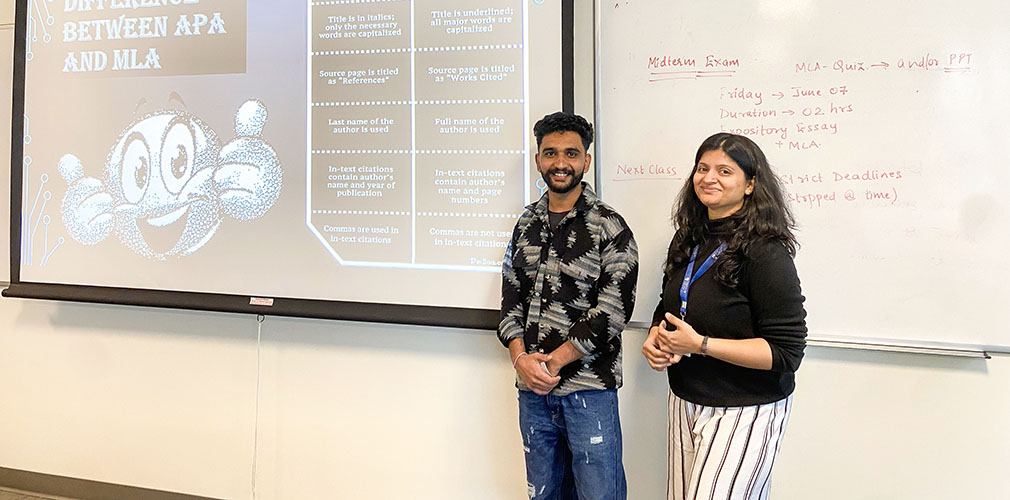
I also teach Introduction to Fiction. It’s a literature course.
Now, one common misconception in this course is that the students tend to think that it’s merely a fun course. You just get to read the stories and it has no real-world application. My students always tell me, “Professor, where will we use this?” It does not get translated, according to them, into real life.
I would say this is kind of true because when you are in an interview, nobody is going to ask you to read a story and produce a paper on it.
But once you crack that interview and are in a real life setting, be it your professional setting or your personal setting, every single time, you will be asked to present the pieces of information effectively.
You will be asked to take a stance and substantiate that stance with evidence. You will be required to argue without fighting and that’s what we learn in here.
Also, in the words of one of my favourite fictional characters,
“Medicine, law, business, engineering, these are noble pursuits and necessary to sustain life. But poetry, beauty, romance, love, these are what we stay alive for.”
Words have transformative power and that’s what they learn in this class, for sure.
Q. I’ve read that your teaching centers around the multiliteracies approach. How does it work?
This framework puts emphasis on the ever-evolving literacy practices. Students’ attention span has gone down terribly. That’s why it’s important that we bring in visual elements, digital elements, multimodal elements.
This is how we integrate different forms of literacies like digital storytelling, flipped classroom, interactive blogs, role-plays, everything together so that learning becomes a transactional and interactive piece in the whole concept of the teaching and learning process.
Q. If you could give advice to yourself when you were a student, what would it be?
I would say that you don’t have to be perfect. I mean, it’s okay to not know all the answers and that is not a sign of weakness. If anything, it is a sign of strength because when you don’t know an answer, you become a seeker for one.
In the past, I’d always wanted to be the first, you know, I wanted to ace all the races, but I don’t think that’s important.
I would also tell myself that one piece of paper does not determine your success. You might fail a course, but still succeed in life.
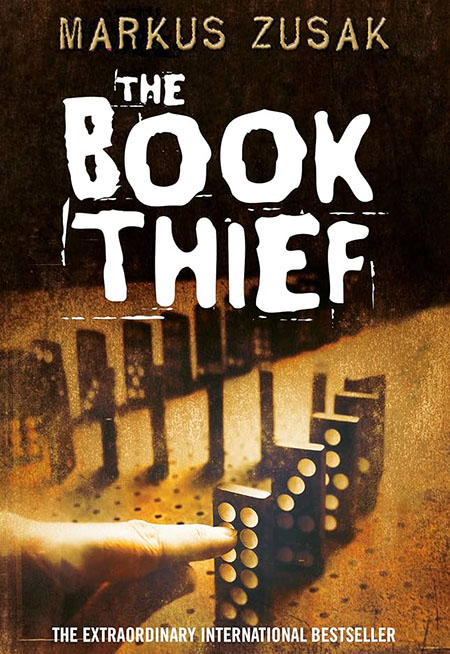
Q. What’s a book you would recommend?
I’d say the one book that never left me was The Book Thief by Markus Zusak. It’s a coming-of-age story set in Nazi Germany during World War II.
Do you know who’s the narrator in the story?
The Force of Death. And when Death is telling the story, you have to listen. And this particular book is really close to my heart because one of its central themes is the power of words.
Words can instigate, can connect, can do anything.
That’s what I love about this book and you have to read it to know more.
Q. Is there anything else you want readers to know about you or just life in general?
What I’ve observed is everybody wants to have an amazing vocabulary and they want to work hard. My piece of advice to them would be if you want to rev up your vocabulary game, start with this magic word.
It is a four letter word. It is R-E-A-D. Read widely, passionately, extensively, and with pleasure.
And I mean, most of my students are always short of time, so I understand. So my advice to them would be, you know, start small. It could be one paragraph, one page every night, but make it count, make it a nonnegotiable. Even these short bursts of reading can have an astounding effect over time!
Alexander College acknowledges that the land on which we usually gather is the traditional, ancestral and unceded territory of the Coast Salish peoples, including the territories of the xʷməθkwəy̓əm (Musqueam), Skwxwú7mesh (Squamish), and Səl̓ílwətaʔ/Selilwitulh (Tsleil-Waututh) Nations. We are grateful to have the opportunity to work in this territory.
Alexander College acknowledges that the land on which we usually gather is the traditional, ancestral and unceded territory of the Coast Salish peoples, including the territories of the xʷməθkwəy̓əm (Musqueam), Skwxwú7mesh (Squamish), and Səl̓ílwətaʔ/Selilwitulh (Tsleil-Waututh) Nations. We are grateful to have the opportunity to work in this territory.